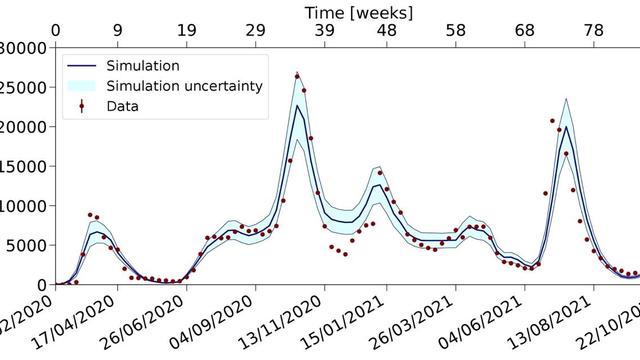New Publication
IFAE COVID-19 Group Publishes Final Study on Catalonia’s Pandemic Response in Scientific Reports
January 7, 2025
IFAEThe IFAE COVID-19 group has published the final results of an I+D+I project funded under the AGAUR PANDÈMIES-2020 programme, which developed a powerful stochastic simulation framework to assess the impact of COVID-19 in Catalonia. Using detailed demographic and mobility information together with extensive health datasets, the study published in Nature Scientific Reports quantifies the effects of non-pharmaceutical interventions and vaccination, providing an evidence-based framework to evaluate pandemic response strategies.
This publication is the final outcome of the coordinated research project “A powerful stochastic tool to assess the impact of the COVID-19 in Catalonia integrating detailed demographic and mobility data”, funded by AGAUR in the call PANDÈMIES-2020. The project is led by IFAE (M. Bosman as Principal Investigator) in coordination with the Centre d’Estudis Demogràfics (CED) and the Foundation for Advanced Digital Technologies (i2CAT).
When the COVID-19 pandemic started, the consortium launched a multidisciplinary research effort integrating epidemiological information with demographic structure and mobility patterns. The IFAE team contributing to this project includes L. Gabbanelli, M. Manera, M. Martinez, P. Masjuan, Ll. Mir, I. Riu and V. Vitagliano.
Leveraging disaggregated socio-demographic microdata, mobile phone mobility data and large health datasets, the researchers developed a comprehensive agent-based network model of the Catalan population. Through large-scale numerical simulations covering the period 2020–2021, the model reproduces the historical evolution of the pandemic and allows a quantitative assessment of the population-level impact of non-pharmaceutical interventions and vaccination campaigns. The figure illustrates the agreement between simulated results and observed epidemiological data for Catalonia.
Beyond its retrospective analysis, the work provides a methodological framework that can be adapted to future public health emergencies. By integrating detailed demographic information and mobility data, the model supports evidence-based evaluation of intervention strategies and their potential impact at population scale.
An Agent-Based Simulation of COVID-19 History in Catalonia Using Extensive Real Datasets
M. Bosman, Y. Cordon, M. Duran-Sala, L. Gabbanelli, C. García-Pérez, X. Jordan, M. Manera, P. Masjuan, A. Medina, Ll. M. Mir, A. Oròs, and V. Vitagliano

Educational program
IFAE and Escola Sant Martí de Cerdanyola launch Magnet alliance
February 19, 2026
The Institut de Física d’Altes Energies (IFAE) and the Escola Sant Martí de Cerdanyola have officially launched their Magnet alliance, within the ‘Magnet. Aliances per a l’èxit educatiu’ programme promoted by the Fundació Bofill. The presentation brought together representatives from the school community, the local council, the education administration and IFAE.
#cientifiques
Tamara Vázquez Schröder participates in the launch of 'científiques 2026'
January 28, 2026
Tamara Vázquez Schröder, researcher in the Collider Physics Group at the Institut de Física d’Altes Energies (IFAE), took part in the launch event of the 2026 edition of the #científiques programme, held on 27 January 2026 at the UAB Casa Convalescència in Barcelona. The event marked the start of this year’s activities ahead of the International Day of Women and Girls in Science, celebrated on 11 February.
Outreach
IFAE brings the physics of the Universe to schools through Escola en Residència
December 18, 2025
IFAE takes part in Escola en Residència , an educational programme led by the Centre de Cultura Contemporània de Barcelona (CCCB), with a project focused on the physics of the Universe. The initiative is developed together with students from the Institut Miquel Tarradell , and aims to bring fundamental physics into the classroom through dialogue, curiosity and collective exploration.
